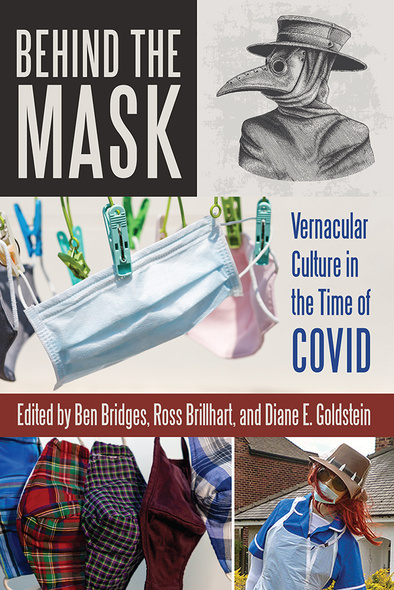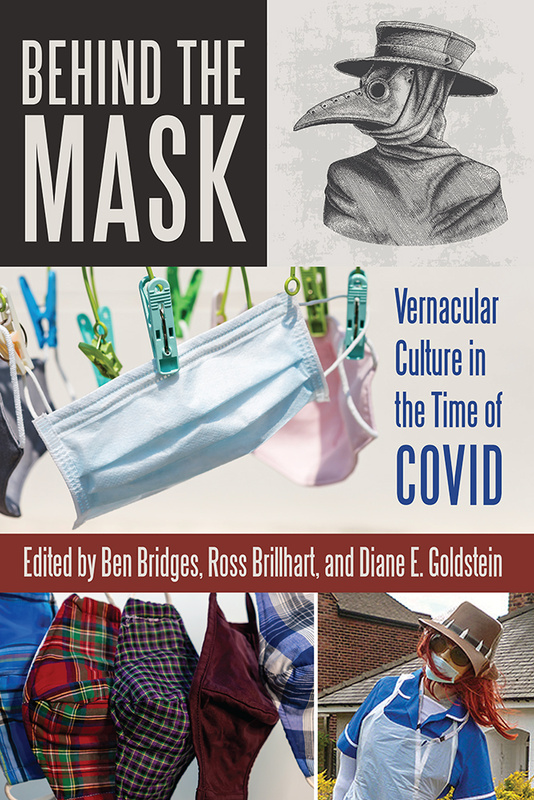Our shopping cart is currently down. To place an order, please contact our distributor, UTP Distribution, directly at utpbooks@utpress.utoronto.ca.

294 pages, 6 x 9
34
Paperback
Release Date:15 Nov 2023
ISBN:9781646424801
Hardcover
Release Date:15 Nov 2023
ISBN:9781646424795
Behind the Mask
Vernacular Culture in the Time of COVID
Utah State University Press
Vernacular responses have been crucial for communities seeking creative ways to cope with the coronavirus pandemic. With most people locked down and separated from the normal ebb and flow of life for an extended period of time, COVID-19 inspired community and creativity, adaptation and flexibility, traditional knowledge, resistance, and dynamism. Removing people from assumed norms and daily lives, the pandemic provided a moment of insight into the nature of vernacular culture as it was used, abused, celebrated, critiqued, and discarded. In Behind the Mask, contributors from the USA, the UK, and Scandinavia emphasize the choices that individual people and communities made during the COVID pandemic, prioritizing the everyday lives of people enduring this health crisis.
Despite vernacular’s potential nod to dominant or external culture, it is the strong connection to the local that grounds the vernacular within the experiential context that it occupies. Exploring the nature and shape of vernacular responses to the ongoing public health crisis, Behind the Mask documents processes that are otherwise likely to be forgotten. Including different ethnographic presents, contributors capture moments during the pandemic rather than upon reflection, making the work important to students and scholars of folklore and ethnology, as well as general readers interested in the COVID pandemic.
Despite vernacular’s potential nod to dominant or external culture, it is the strong connection to the local that grounds the vernacular within the experiential context that it occupies. Exploring the nature and shape of vernacular responses to the ongoing public health crisis, Behind the Mask documents processes that are otherwise likely to be forgotten. Including different ethnographic presents, contributors capture moments during the pandemic rather than upon reflection, making the work important to students and scholars of folklore and ethnology, as well as general readers interested in the COVID pandemic.
‘As we struggle through the pandemic’s vicissitudes, we need these insights. The book also provides a significant historical and analytical record that is an important source for future academic and public health specialists.’
—Elizabeth Tucker, Binghamton University'A worthy documentation of ephemeral, yet revealing traditions, and the ground the authors break could well make the theme for another wide-ranging book.'
—Journal of Folklore Research Reviews
Ben Bridges is a dual PhD candidate in folklore and anthropology at Indiana University. His current research examines vernacular responses to global environmental crises and the intersections between landscapes and memory, principally as these phenomena manifest in southeast Alaska.
Ross Brillhart is the program manager at the Divided Sky Foundation in Ludlow, Vermont. He has ongoing projects centering on religion, sound, healing, and the natural world in the Blue Mountains of Jamaica; music and sound in hospice care; and music, sound, and Parkinson’s disease.
Diane E. Goldstein is emeritus professor and former chair of the Department of Folklore and Ethnomusicology at Indiana University. She is the author of Once Upon a Virus, coauthor of Haunting Experiences, coeditor of The Stigmatized Vernacular and Reckless Vectors, and editor of one of the earliest interdisciplinary HIV/AIDS anthologies, Talking AIDS: Interdisciplinary Perspectives on Acquired Immune Deficiency Syndrome.
Ross Brillhart is the program manager at the Divided Sky Foundation in Ludlow, Vermont. He has ongoing projects centering on religion, sound, healing, and the natural world in the Blue Mountains of Jamaica; music and sound in hospice care; and music, sound, and Parkinson’s disease.
Diane E. Goldstein is emeritus professor and former chair of the Department of Folklore and Ethnomusicology at Indiana University. She is the author of Once Upon a Virus, coauthor of Haunting Experiences, coeditor of The Stigmatized Vernacular and Reckless Vectors, and editor of one of the earliest interdisciplinary HIV/AIDS anthologies, Talking AIDS: Interdisciplinary Perspectives on Acquired Immune Deficiency Syndrome.




